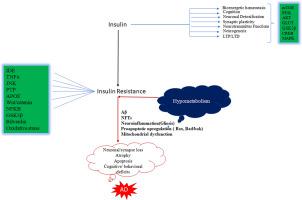Life Sciences ( IF 5.2 ) Pub Date : 2020-09-12 , DOI: 10.1016/j.lfs.2020.118401 Vivek Kumar Sharma 1 , Thakur Gurjeet Singh 2

|
Aim
Insulin has a well-established role in cognition, neuronal detoxification and synaptic plasticity. Insulin transduction affect neurotransmitter functions, influence bioenergetics and regulate neuronal survival through regulating glucose energy metabolism and downward pathways.
Methods
A systematic literature review of PubMed, Medline, Bentham, Scopus and EMBASE (Elsevier) databases was carried out with the help of the keywords like “Alzheimer's disease; Hypometabolism; Oxidative stress; energy failure in AD, Insulin; Insulin resistance; Bioenergetics” till June 2020. The review was conducted using the above keywords to collect the latest articles and to understand the nature of the extensive work carried out on insulin resistance and bioenergetic manifestations in Alzheimer's disease.
Key findings
The article sheds light on insulin resistance mediated hypometabolic state on pathological progression of AD. The disrupted insulin signaling has pathological outcome in form of disturbed glucose homeostasis, altered bioenergetic state which increases build-up of senile plaques (Aβ), neurofibrillary tangles (τ), decline in transportation of glucose and activation of inflammatory pathways. The mechanistic link of insulin resistant state with therapeutically explorable potential transduction pathways is the focus of the reviewed work.
Significance
The present work opines that the mechanism by which the insulin resistance mediates dysregulation of bioenergetics and progresses to neurodegenerative state holds the tangible potential to succeed in the development of novel dementia therapies. Further, hypometabolic complications and altered insulin signaling may be explored as a mechanistic relation between bioenergetic deficits and AD.
中文翻译:

胰岛素抵抗和生物能表现:阿尔茨海默氏病的目标和方法。
目标
胰岛素在认知,神经元排毒和突触可塑性中具有公认的作用。胰岛素转导通过调节葡萄糖能量代谢和向下的途径,影响神经递质的功能,影响生物能并调节神经元的存活。
方法
在诸如“阿尔茨海默氏病”等关键字的帮助下,对PubMed,Medline,Bentham,Scopus和EMBASE(Elsevier)数据库进行了系统的文献综述。代谢不足; 氧化应激 AD,胰岛素的能量衰竭;胰岛素抵抗; 直到2020年6月为止。我们使用上述关键字进行了综述,以收集最新文章,并了解针对阿尔茨海默氏病的胰岛素抵抗和生物能表现进行的广泛研究的性质。
主要发现
这篇文章揭示了胰岛素抵抗介导的AD代谢的低代谢状态。胰岛素信号的破坏具有病理结果,其形式为葡萄糖稳态失调,生物能状态改变,从而增加了老年斑(Aβ),神经原纤维缠结(τ)的积累,葡萄糖转运的减少和炎症途径的激活。胰岛素抵抗状态与可治疗性潜在转导途径的机制联系是本研究的重点。
意义
本工作认为,胰岛素抵抗介导生物能的失调并发展为神经退行性状态的机制具有成功开发新型痴呆疗法的切实潜力。此外,代谢不足的并发症和改变的胰岛素信号传导可能被探讨为生物能缺乏与AD之间的机械关系。











































 京公网安备 11010802027423号
京公网安备 11010802027423号